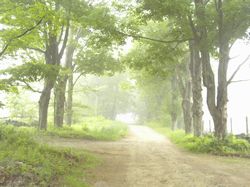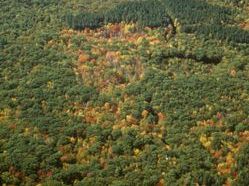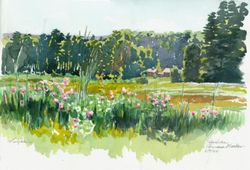

Harvard University awards a limited number of Bullard Fellowships annually to individuals pursuing a variety of approaches to the study of forested ecosystems. Starting in 2024, Bullard Fellowships may be awarded as “Short-Term” fellowships (2-3 months) or “Long-Term” fellowships (6 to 12 months). We have added the Short-Term fellowships to increase the diversity of our applicants and to include fellows who, for whatever reason, cannot commit to being in residence for 6 months or more. Both the Short and Long-Term fellowships are full-time residential fellowships designed to allow individuals to foster their scientific and professional growth and to contribute to research on forests at Harvard.
A major goal of the Bullard Fellowship program is to enhance research activities at Harvard Forest and build long-term collaborations that connect Harvard Forest with other parts of the University. Fellows can be based at the Harvard Forest or associated with other departments and centers at Harvard, such as the Department of Organismic and Evolutionary Biology, the Salata Institute for Climate and Sustainability, and the Arnold Arboretum. Bullard Fellowships are not intended for post-doctoral fellows; instead they are targeted at individuals with a record of independent scholarship and professional accomplishment.
Fellowships are occasionally awarded in the arts and environmental humanities, though these are rare. Please note that proposals in the arts and humanities must demonstrate a strong connection to the research at Harvard Forest and may undergo a separate review process led by Harvard University colleagues from the appropriate discipline.
Fellowships are either 2 to 3 months (Short-Term Fellows) or 6–12 months (Long-Term Fellows), and offer a stipend of $6250 per month (i.e., $75,000 per year). Awards are not intended for graduate students or recent postdoctoral candidates. Fellows are expected to be in residence throughout their fellowship. Typically, this means that Fellows are present at the Harvard Forest or their Harvard University host lab at least three days per week. All Fellows are expected to attend Harvard Forest Lab Meetings on Wednesdays and other community events. Our intent is to have Bullard Fellows become fully immersed in our community.
Harvard Forest is committed to establishing and maintaining a diverse and inclusive community that collectively supports and implements our mission.
Applications will open August 1, 2025 for fellowship opportunities in 2026-2027.
The deadline for applications is October 1, 2025.
Apply Online
View the listing of past fellowship recipients or learn more about this year's Bullard Fellows.
Before applying, please review the following (scroll down the page to see the sections):
- Qualifications
- Fellowship Scope
- Program Affiliations
- Stipends
- Duration
- Host
- Application Procedure
- Fellowship Location
- Taxes
- Health Insurance
- International Fellows
As we work to continue the high levels of vaccination needed to protect our community, Harvard highly recommends being up-to-date per the CDC definition for all Harvard community members, including faculty, students, staff, and researchers, who will have any on-campus presence.
Qualifications
Bullard Fellowships are generally awarded to individuals who have established themselves in academia, public service, or in the private sector. Bullard Fellowships are intended for scholars and practitioners who have demonstrated substantial accomplishment and vision; recent PhD graduates are generally not appropriate. For those in academic careers, preference is given to holders of doctoral degrees who received their degrees at least two years prior to applying and have published a monograph or at least two (humanities and social sciences) or five (STEM) articles in refereed journals or edited collections. Applicants from outside academia must demonstrate leadership in their field and propose a project that shows promise of making important contributions to forest studies, broadly defined. All applicants will be considered in terms of the likelihood that study at Harvard will help advance their careers and the Mission, Vision, and Values of the Harvard Forest. Judgments of the Bullard Review Committee are based primarily on the quality of the applicant's professional accomplishments, academic record, and potential benefits from interaction with the Harvard Forest community and its institutional resources.
Fellowship Scope
Research areas include forest ecology, tree physiology, soil biogeochemistry and microbial ecology, forest resource management, conservation and biodiversity, land use planning, and public policy. Fellowships are occasionally awarded in the arts and environmental humanities. Please note that proposals in the arts and humanities must demonstrate a strong connection to the research at Harvard Forest and will undergo a separate review process led by Harvard University colleagues from the appropriate discipline.
Program Affiliations
 A major goal of the Bullard Fellowship program is to enhance research activities at Harvard Forest and build long-term collaborations that connect Harvard Forest with other parts of the University. Fellows can be based at the Harvard Forest or associated with other departments and centers at Harvard University. Potential fellows are encouraged to contact appropriate Harvard collaborators well in advance of the application deadline.
A major goal of the Bullard Fellowship program is to enhance research activities at Harvard Forest and build long-term collaborations that connect Harvard Forest with other parts of the University. Fellows can be based at the Harvard Forest or associated with other departments and centers at Harvard University. Potential fellows are encouraged to contact appropriate Harvard collaborators well in advance of the application deadline.
Previous Fellows have collaborated with researchers and faculty at:
- Harvard Forest, Petersham
- Arnold Arboretum, Jamaica Plain
- Department of Earth and Planetary Sciences
- Department of Organismic and Evolutionary Biology
- Harvard Business School
- Harvard Graduate School of Design
- Harvard Kennedy School of Government
- Harvard University Center for the Environment (HUCE)
- or a combination of these research institutions
Stipends
The Fellowships carry stipends up to $6250 per month (i.e., a max of $75,000 for a year); the amount of each award depends on the duration of the Fellowship. Fellows have the option of having the award paid either to themselves or to the Fellow's employer.
In most cases, the stipend will supplement income received for devoting a period to research, e.g., sabbatical leave pay for an individual in academic life, appointments with federal support for training of individuals in federal public service, or educational leave with pay for individuals in the private sector. Fellowships are not intended to provide significant funds for original research.
Please consider the information regarding costs discussed in the following sections: Fellowship Location, Taxes, Travel Reimbursement, Health Insurance and International Fellows.
Travel Reimbursement
Travel Fellowships All Bullard Fellows will receive a travel fellowship equivalent to the cost of one round trip between their Fellowship site location and their home base. The fellowship will reflect either the actual airfare or mileage (at rate determined by the IRS) between the two, whichever is lower. Bullards are responsible for the travel costs of any people accompanying them.
Duration
Fellowships may start at any time after September 1. Short-Term fellowships are 2 to 3 months and Long-Term fellowships are typically 6 to 12 months in duration.
The application requires:
- A completed web-based application form
- Contact information for 3 references who can give a perspective on the applicant's proposed program and their personal and professional qualifications for carrying it out. Recommenders will receive an email message from the secure online application system with instructions on how to submit their letter of recommendation. Letters for the 2025-2026 program must be submitted by October 15, 2024 (a 2-week grace period post deadline).
- A statement of research describing the applicant's professional career to date, proposing a research program at Harvard and evaluating this program in terms of its potential contribution to the applicant's future professional career (5-page single spaced maximum is requested).
- Host (optional): All Bullard Fellows are required to have a host, who is a Harvard PI who will meet with the Fellows regularly throughout their stay. Applicants may identify a host as part of their application, but are not required to. If no host is identified, the Review Panel will assign a host.
- CV (no more than 5 pages) including the following:
Colleges and universities; dates of attendance and degrees received
Professional positions held since graduating college
Academic prizes and honors, if any
Significant books, articles, reports, etc.
Significant education and outreach activities (NSF calls these "synergistic activities")
Artists should provide a link to an online portfolio of their work
Deadline: Applications must be completed with accompanying documentation by October 1 at 5 pm EST. References are accepted until October 15 Midnight EST. Successful candidates will be notified on or before December 15.
For additional information: e-mail hfapps@fas.harvard.edu.
Fellowship Location
The Bullard Fellowship is a residential program and Fellows are expected to spend a substantial portion of their Fellowship based at either Harvard Forest in Petersham, Massachusetts or at Harvard University in Cambridge, Massachusetts. Currently, staff at Harvard Forest are expected to be on-site Tuesday, Wednesday, and Thursday. Bullards who expect to spend more than a week or two traveling during their Fellowship should include details in their application.
- Fellows based at Harvard Forest will have a variety of resources available to assist with their Fellowship projects:
- Research Resources: weekly seminars and lab groups (September - April), library, archives, LTER Annual symposium (March), office space, local telephone service and basic office supplies at no cost.
- Housing: The Forest has furnished housing available for Bullards for $1,250-$1,900 per month for 1 to 5 bedroom units.
- Local Transportation: Harvard Forest is located in a rural area. As there is no local public transportation, Bullards must have their own vehicle for transportation. The costs of obtaining a vehicle including insurance ($750-$1,500 annually); purchase of the vehicle ($5,000+) as well as maintenance and gas. Bullards are responsible for purchasing their own vehicle.
- Petersham has many resources for its residents.
- Fellows based in Cambridge will need to make arrangements with their proposed collaborators for access to an appropriate office and/or lab space. Cost considerations should include research support costs (e.g. photocopying, office telephone, fax, office supplies, travel, lab/research/field supplies) and housing ($1,500-3,000/month, based upon size and location of unit). One source for housing convenient to Harvard's Cambridge campus is http://www.hio.harvard.edu/housing.
Taxes
Bullard Fellows are not considered employees of the University and receive no fringe benefits. For U.S. Citizens, taxes are not withheld by HU. Instead, Bullards are expected to make their own arrangements to pay income taxes via quarterly payments to the IRS.
International Bullards (on J visas) should note that HU will withhold an income tax up to 14% of their stipends unless there is a tax treaty between their home country and the US which reduces or waives this requirement. See Harvard Office of Controller for more information.
Health Insurance
Massachusetts state law requires all residents to also have health insurance. Therefore, Bullards without insurance may wish to look at purchasing health insurance through:
- Massachusetts Health Connector. The Health Connector is Massachusetts' health insurance Marketplace where individuals, families, and small businesses can shop among the state's leading health insurance carriers and choose the right plan to meet their needs and budget. Insurance purchased through Mass Health Connector can cost between $300 to $500 per month for a single person and $1000 to $3000 per month for a family of 4 based in Petersham. Note that moving to Massachusetts to begin your fellowship is a "triggering event" allowing you to obtain insurance outside the standard open enrollment period.
- Insurance Plans outside of Harvard. This is a list of policies suggested by the Harvard International Office as providing health insurance policies suitable for international scholars who must have health insurance as a condition of their visa. These policies are also available for US citizens but may be less comprehensive than MHC.
All information regarding insurance is provided to assist Bullard applicants with planning and budgeting but the availability of insurance, its suitability and cost may greatly vary depending on individual circumstances. All insurance costs are the Bullard's responsibility.
International Fellows
International researchers have additional considerations when applying for a Bullard Fellowship, such as the visa process, logistics, and financial implications. All potential international Bullards should consult the Harvard International Office web site (www.hio.harvard.edu), which includes information about visa policies, taxes and health insurance, as well as other helpful topics.
Costs specific to international scholars vary with the length of the fellowship but include visas (up to $1,500 per person), up to 14% income taxes, health insurance ($300 to $500 per month for a single person and $1000 to $3000 per month for a family of 4 based in Petersham), and the travel to the United States for their families.
Commitment to Diversity, Equity, and Inclusion
Harvard Forest is committed to establishing and maintaining a diverse, equitable, and inclusive community. We have initiated an ongoing series of staff-wide trainings and formed a standing committee to build competence in DEIB in our workplace, improved physical and digital accessibility of our campus resources, and re-examined and replaced harmful artwork. We are working toward including Indigenous knowledge and communities in our research and education, land use, and public programs, improving field safety for at-risk populations, and diversifying our team of investigators and educators. The aim of this work is to collectively support and implement our mission: the investigation, understanding, and communication of the ways in which physical, biological, and human systems interact to change our Earth, while ensuring that all participants should feel that they are critical parts of the Harvard Forest community—whatever their identity groups. We welcome, recruit, develop, and advance talented staff, students, and visiting scholars from diverse backgrounds, and strive to ensure that all are included in our mission. Harvard Forest is also committed to supporting the work-life balance of its staff.
We particularly encourage applications from members of groups that have been historically underrepresented in the sciences (Black, Indigenous, and people of color, women, individuals with disabilities, veterans, LGBTQ community members) and others who demonstrate the ability to help us achieve our vision of a diverse and inclusive community.
